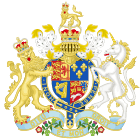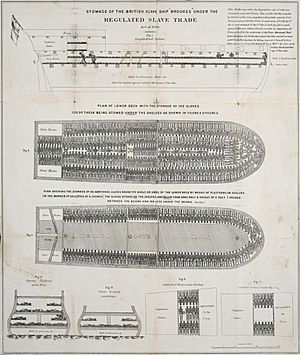Slave Trade Act 1788 facts for kids
| Act of Parliament | |

|
|
| Long title | An Act to regulate, for a limited Time, the shipping and carrying Slaves in British Vessels from the Coast of Africa. |
|---|---|
| Citation | 28 Geo. 3. c. 54 |
Quick facts for kids Dates |
|
| Royal assent | 11 July 1788 |
| Other legislation | |
| Repealed by | Statute Law Revision Act 1871 |
|
Status: Repealed
|
|
| Text of statute as originally enacted | |
The Slave Trade Act 1788, also known as Dolben's Act, was a law passed by the British Parliament. This law limited how many enslaved people British slave ships could carry. The number was based on the ship's size, measured in "tons burthen." This was the very first British law created to control slave shipping.
Contents
Why Was the Slave Trade Act Created?
In the late 1700s, more and more people were speaking out against slavery. Many who wanted to end slavery were deeply upset by the details of the Zong massacre. This terrible event became known in 1783. During this time, the ship owners tried to claim insurance money for 132 to 142 enslaved people who had been killed.
How Did People Fight Against Slavery?
A group called the Quakers worked hard to ask Parliament to stop the slave trade. To get more support, they formed a new group in 1787. It was called the Society for the Abolition of the Slave Trade. This group included people from different churches who all wanted to end slavery.
Sir William Dolben's Role
In 1788, a Member of Parliament named Sir William Dolben took action. He led other MPs to the River Thames to inspect a ship being prepared for a slave voyage. Dolben had already been talking with the Abolition Society. His visit to the slave ship made him even more determined to oppose the slave trade.
The campaigning by the Abolition Society caught the attention of the Prime Minister, William Pitt. He ordered an investigation into the slave trade. Pitt also asked another MP, William Wilberforce, to start a discussion about the issue in the House of Commons. However, by May 1788, the special committee Pitt had asked to investigate had not yet finished its report.
Debating the Slave Trade in Parliament
On May 9, 1788, Pitt suggested that Parliament should wait until its next session to discuss the slave trade. He said that so many anti-slavery requests had been sent to the House. This meant there wasn't enough time to properly discuss the issue in the current session.
Representatives from Liverpool, a city heavily involved in the British slave trade, liked Pitt's idea. They wanted a debate so they could argue against the claims made in the anti-slavery requests.
Sir William Dolben, representing Oxford University, then spoke. He argued that 10,000 lives would be lost if Parliament did not act right away. He wanted immediate rules to limit the number of Africans that slave ship captains could take on board. This would help reduce deaths caused by overcrowding and poor hygiene. Even though Dolben was against the slave trade, he did not suggest ending slavery completely at this time.
Lord Penrhyn, an MP for Liverpool, disagreed with Dolben. He claimed that captains wanted to keep as many enslaved people alive as possible. This was because they made money from selling them.
How the Act Became Law
Encouraged by Prime Minister Pitt, Dolben wrote a new bill. He presented it to the House of Commons on May 21. The bill was approved quickly, passing its second reading on June 17 and its third reading the next day.
It was then sent to the House of Lords, where it was also approved. However, the Lords added a change about paying compensation, which the Commons felt was their job to decide. So, a new bill was written, passed, and sent back to the Lords. This final version was approved by the Lords on July 10 and became law soon after. This was the first British law to regulate slave ships.
What Did the Slave Trade Act Do?
The Act stated that ships could carry about 1.67 enslaved people for every ton of the ship's size, up to 207 tons. After that, they could only carry 1 enslaved person per ton. This meant larger ships had stricter limits.
The rules of the 1788 Act were only for one year. This meant Parliament had to renew the Act every year. Dolben worked hard to make sure it was renewed in the years that followed. He often spoke out against the slave trade in Parliament. The Act was renewed between 1789 and 1795, and again between 1797 and 1798. In 1799, the rules from these acts were made permanent by the Slave Trade Act of 1799.
Who Supported and Opposed the Act?
Some people who wanted to end slavery supported the Act. This included Olaudah Equiano, an African man who had once been enslaved. However, some abolitionists, like William Wilberforce, worried. They feared the Act might make it seem like the slave trade was okay, as long as it was regulated, instead of being completely wrong.
What Were the Effects of the Act?
The number of enslaved people who died on British ships went down during the 1790s. This Act helped lower the overall death rate on British ships between 1790 and 1830. With fewer enslaved people packed onto ships, illnesses could be controlled better, and food supplies lasted longer.
During this time, ship captains were also given rewards for having lower death rates. As they had more reasons to keep people alive, the death rates continued to drop. While some captains might have tried to cheat the system, research generally shows a decrease in deaths.
Historian Roger Anstey suggested that the Act's limits might explain this decline. However, other historians have debated if there was a clear link between less crowding and lower death rates. More recent studies suggest that earlier research had errors in its records. These newer studies show that the Act did reduce deaths caused by overcrowding. For example, the death rate on Dutch ships, which did not have these limits, did not go down during the same period.


